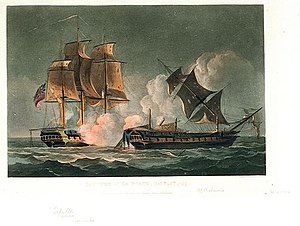French frigate Forte (1794)

Forte in her battle against HMS Sybille
|
|
| History | |
|---|---|
|
|
|
| Name: | Forte |
| Ordered: | 5 July 1794 |
| Builder: | Lorient |
| Laid down: | 30 May 1794 |
| Launched: | 26 September 1794 |
| Commissioned: | November 1794 |
| Captured: | 1 March 1799, by the Royal Navy |
|
|
|
| Name: | Forte |
| Acquired: | 1 March 1799 |
| Fate: | Wrecked 29 January 1801 |
| General characteristics | |
| Type: | 42-gun Forte class frigate |
| Tonnage: | 1020 tonnes |
| Length: | 52 m (171 ft) |
| Beam: | 13 m (43 ft) |
| Draught: | 6.2 m (20 ft) |
| Sail plan: | Full-rigged ship |
| Armament: |
|
Forte was a French 42-gun frigate, lead ship of her class.
Launched on 26 September 1794 and commissioned two months later under Commander Beaulieu-Leloup, Forte was part of a large frigate squadron under contre-amiral Sercey, also comprising Prudente, Régénérée, Vertu, Seine, Cybèle and Preneuse. The division sailed to Ile de France to raid commerce in the Indian Ocean.
Forte took part in the Action of 8 September 1796, where the frigates drove off two British 74-guns.
In 1797, Forte and Prudente were sent to Batavia to ferry troops. Command of Forte was given to Captain Ravenel. Against the wishes of Sercey, General Malartic restored Beaulieu to command.
In 1811 French naval engineers examined the USS Constitution while she was visiting Cherbourg. The engineers compared the design of the American frigate to that of the lost Forte.
On 24 February 1799, Forte encountered the East Indiaman Osterley. A sharp single-ship action developed, with Osterley losing four men killed and 13 wounded before she struck. Forte spent two days or so transferring some of Osterley's cargo before he let her and her crew proceed. Some accounts state that he released her as a cartel for an exchange of prisoners.
...
Wikipedia
